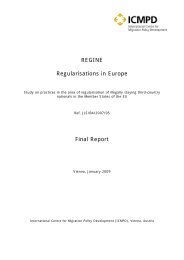taxud/2414/08 - European Commission - Europa
taxud/2414/08 - European Commission - Europa
taxud/2414/08 - European Commission - Europa
You also want an ePaper? Increase the reach of your titles
YUMPU automatically turns print PDFs into web optimized ePapers that Google loves.
physical, technical or administrative services, which do not alter the legal or financial<br />
situation.<br />
Article 20<br />
The following shall be considered to be services having the specific and essential<br />
character of the "supply of securities" as defined in point (8) of Article 135a of Directive<br />
2006/112/EC:<br />
(1) the issuance of options, futures and forward contracts for securities;<br />
These are supplies of derivatives; in finance options are types of derivative contracts,<br />
including call options and put options, where the future payoffs to the buyer and seller of<br />
the contract are determined by the price of another security, such as a common stock.<br />
More specifically, a call option is an agreement in which the buyer (holder) has the right<br />
(but not the obligation) to exercise by buying an asset at a set price (strike price) on (for a<br />
<strong>European</strong> style option) or not later than (for an American style option) a future date (the<br />
exercise date or expiration); and the seller (writer) has the obligation to honour the terms<br />
of the contract. A put option is an agreement in which the buyer has the right (but not the<br />
obligation) to exercise by selling an asset at the strike price on or before a future date;<br />
and the seller has the obligation to honour the terms of the contract;<br />
The supply of futures for securities is specific to and essential for the "supply of<br />
securities"; in finance, a futures contract is a standardized contract, traded on a futures<br />
exchange, to buy or sell a certain underlying security at a certain date in the future, at a<br />
specified price. The future date is called the delivery date or final settlement date. The<br />
pre-set price is called the futures price. The price of the underlying security on the<br />
delivery date is called the settlement price. The settlement price, normally, converges<br />
towards the futures price on the delivery date. A futures contract gives the holder the<br />
obligation to buy or sell, which differs from an options contract and which gives the<br />
holder the right, but not the obligation. In other words, the owner of an options contract<br />
may exercise the contract. Both parties of a "futures contract" must fulfil the contract on<br />
the settlement date;<br />
The supply of forward contracts for securities is the supply of a service containing an<br />
agreement between two parties to buy or sell a security at a pre-agreed future point in<br />
time. Therefore, the trade date and delivery date are separated. One party agrees to buy,<br />
the other to sell, for a forward price agreed in advance. In a forward transaction, no<br />
actual cash changes hands. If the transaction is collateralized, exchange of margin will<br />
take place according to a pre-agreed rule or schedule. Otherwise no security of any kind<br />
actually changes hands, until the maturity of the contract. The forward price of such a<br />
contract is commonly contrasted with the spot price, which is the price at which the<br />
security changes hands. The difference between the spot and the forward price is the<br />
forward premium or forward discount. A standardized forward contract that is traded on<br />
an exchange is called a futures contract;<br />
(2) the issuance of equity swaps and other total return swaps in securities;<br />
53
















